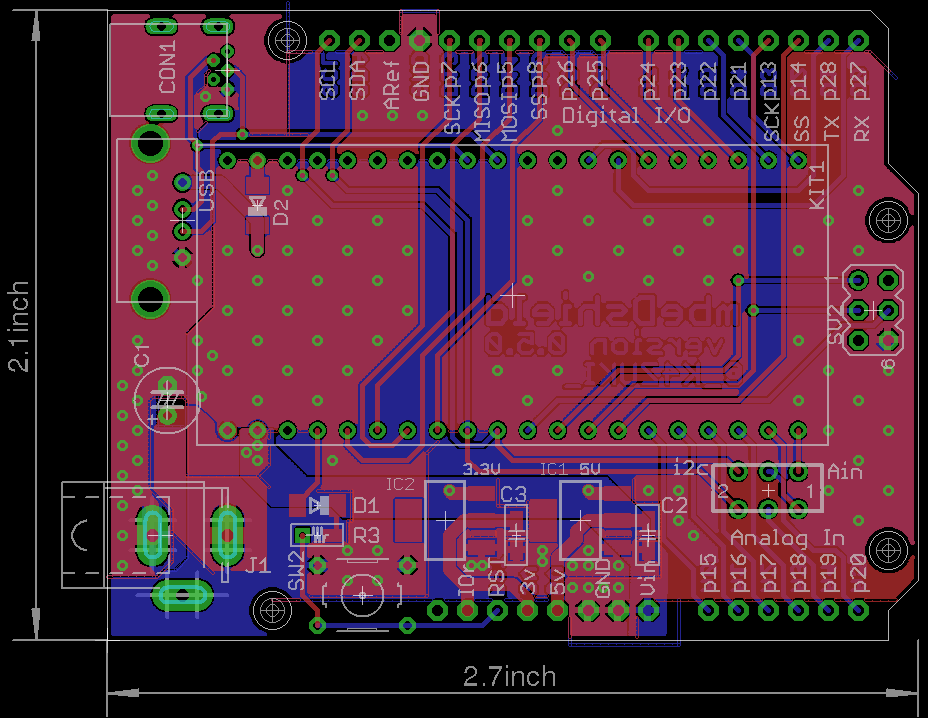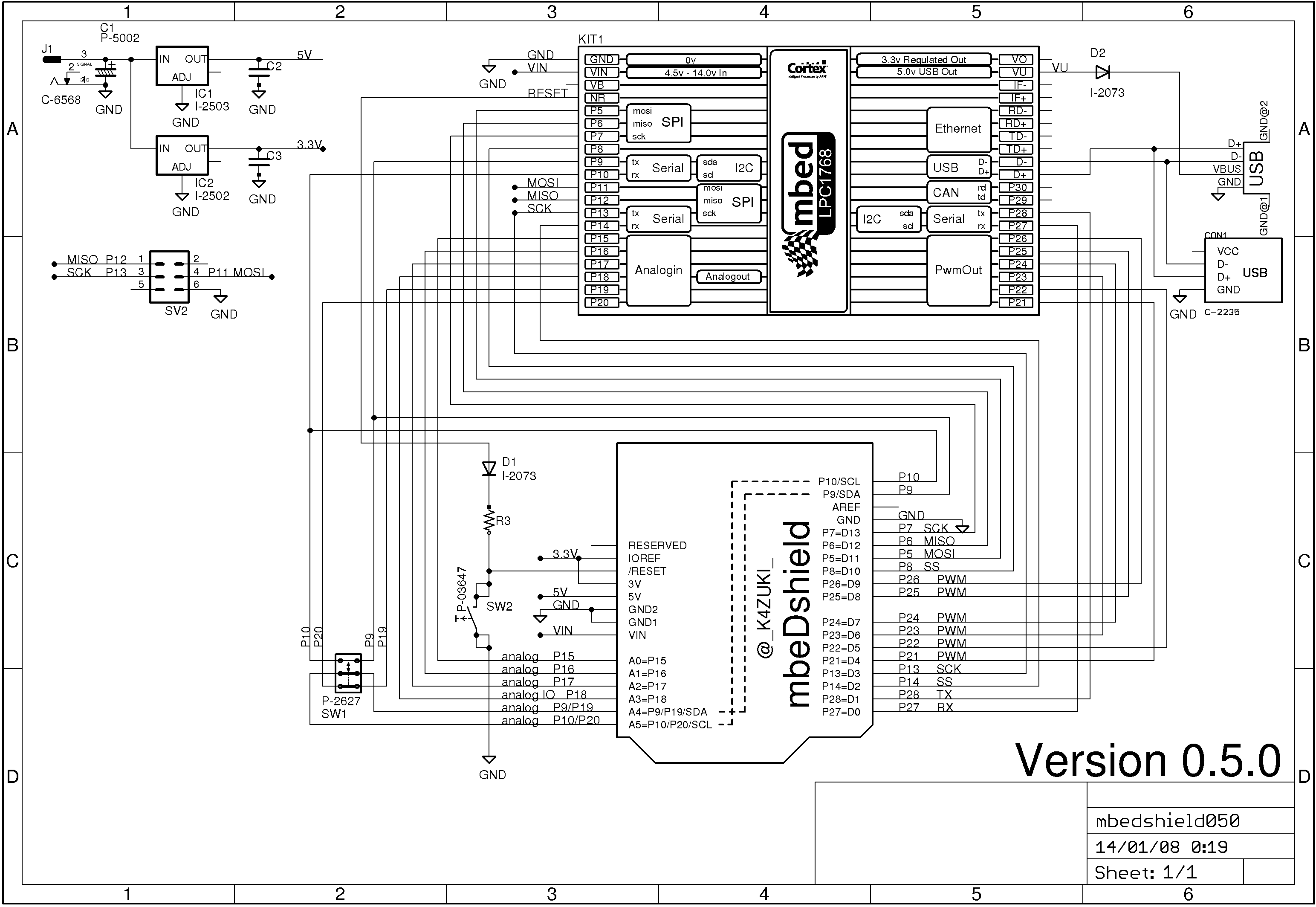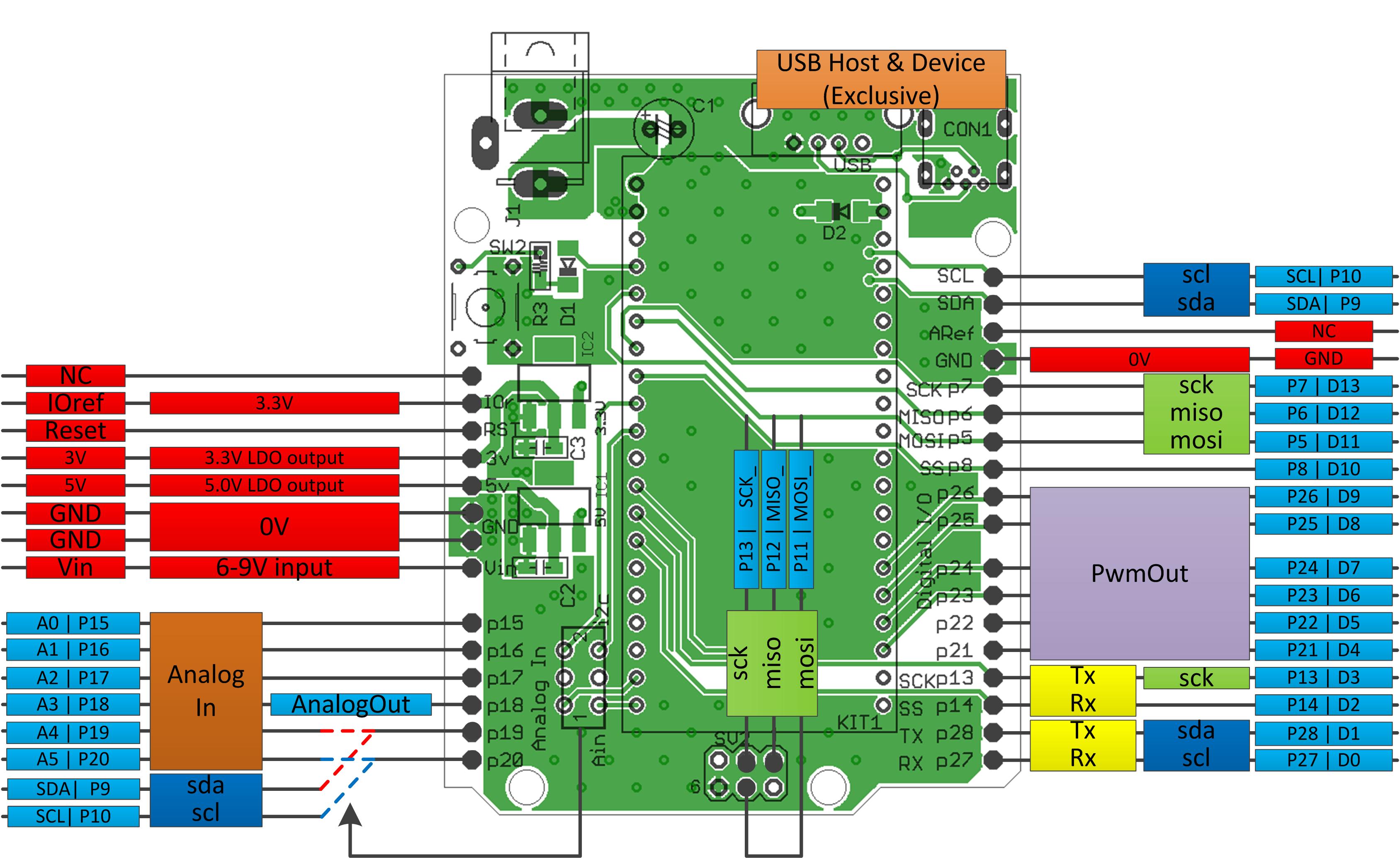The official mbed C/C SDK provides the software platform and libraries to build your applications.
Fork of mbed by
(01.May.2014) started sales! http://www.switch-science.com/catalog/1717/
(13.March.2014) updated to 0.5.0
This is a pin conversion PCB from mbed 1768/11U24 to arduino UNO.
- So if you have both mbed and arduino shields, I guess you would be happy with such a conversion board :)
Photos
- Board photo vvv

- Schematic photo vvv

- Functionality photo vvv

Latest eagle files
PCB >> /media/uploads/k4zuki/mbedshield050.brd
SCH >> /media/uploads/k4zuki/mbedshield050.sch
BIG changes from previous version
- Ethernet RJ45 connector is removed.
- http://mbed.org/components/Seeed-Ethernet-Shield-V20/ is the biggest hint to use Ethernet!
MostALL of components can be bought at Akizuki http://akizukidenshi.com/- But sorry, they do not send parts to abroad
- Pinout is changed!
| arduino | 0.4.0 | 0.5.0 |
|---|---|---|
| D4 | p12 | p21 |
| D5 | p11 | p22 |
| MOSI_ | none | p11 |
| MISO_ | none | p12 |
| SCK_ | none | p13 |
This design has bug(s)
- I2C functional pin differs between 1768 and 11U24.
Fixed bugs here
- MiniUSB cable cannot be connected on mbed if you solder high-height electrolytic capacitor on C3.
- http://akizukidenshi.com/catalog/g/gP-05002/ is the solution to make this 100% AKIZUKI parts!
- the 6-pin ISP port is not inprimented in version 0.4.0
it will be fixed in later version 0.4.1/0.4.2/0.5.0This has beenfixed
I am doing some porting to use existing arduino shields but it may faster if you do it by yourself...
you can use arduino PinName "A0-A5,D0-D13" plus backside SPI port for easier porting.
To do this you have to edit PinName enum in
- "mbed/TARGET_LPC1768/PinNames.h" or
- "mbed/TARGET_LPC11U24/PinNames.h" as per your target mbed.
here is the actual list: This list includes define switch to switch pin assignment
part_of_PinNames.h
USBTX = P0_2,
USBRX = P0_3,
//from here mbeDshield mod
D0=p27,
D1=p28,
D2=p14,
D3=p13,
#ifdef MBEDSHIELD_050
MOSI_=p11,
MISO_=p12,
SCK_=p13,
D4=p21,
D5=p22,
#else
D4=p12,
D5=p11,
#endif
D6=p23,
D7=p24,
D8=p25,
D9=p26,
D10=p8,
D11=p5,
D12=p6,
D13=p7,
A0=p15,
A1=p16,
A2=p17,
A3=p18,
A4=p19,
A5=p20,
SDA=p9,
SCL=p10,
//mbeDshield mod ends here
// Not connected
NC = (int)0xFFFFFFFF
Diff: SerialHalfDuplex.h
- Revision:
- 43:e2ed12d17f06
- Parent:
- 30:3991a86798e3
--- a/SerialHalfDuplex.h Wed Aug 29 12:44:47 2012 +0100
+++ b/SerialHalfDuplex.h Fri Oct 26 17:40:46 2012 +0100
@@ -15,67 +15,64 @@
namespace mbed {
-/* Class: SerialHalfDuplex
- * A serial port (UART) for communication with other devices using
- * Half-Duplex, allowing transmit and receive on a single
- * shared transmit and receive line. Only one end should be transmitting
- * at a time.
+/** A serial port (UART) for communication with other devices using
+ * Half-Duplex, allowing transmit and receive on a single
+ * shared transmit and receive line. Only one end should be transmitting
+ * at a time.
*
- * Both the tx and rx pin should be defined, and wired together.
- * This is in addition to them being wired to the other serial
- * device to allow both read and write functions to operate.
+ * Both the tx and rx pin should be defined, and wired together.
+ * This is in addition to them being wired to the other serial
+ * device to allow both read and write functions to operate.
+ *
+ * For Simplex and Full-Duplex Serial communication, see Serial()
+ *
+ * Example:
+ * @code
+ * // Send a byte to a second HalfDuplex device, and read the response
+ *
+ * #include "mbed.h"
*
- * Example:
- * > // Send a byte to a second HalfDuplex device, and read the response
- * >
- * > #include "mbed.h"
- * >
- * > // p9 and p10 should be wired together to form "a"
- * > // p28 and p27 should be wired together to form "b"
- * > // p9/p10 should be wired to p28/p27 as the Half Duplex connection
- * >
- * > SerialHalfDuplex a(p9, p10);
- * > SerialHalfDuplex b(p28, p27);
- * >
- * > void b_rx() { // second device response
- * > b.putc(b.getc() + 4);
- * > }
- * >
- * > int main() {
- * > b.attach(&b_rx);
- * > for(int c = 'A'; c < 'Z'; c++) {
- * > a.putc(c);
- * > printf("sent [%c]\n", c);
- * > wait(0.5); // b should respond
- * > if(a.readable()) {
- * > printf("received [%c]\n", a.getc());
- * > }
- * > }
- * > }
- *
- * For Simplex and Full-Duplex Serial communication, see <Serial>
+ * // p9 and p10 should be wired together to form "a"
+ * // p28 and p27 should be wired together to form "b"
+ * // p9/p10 should be wired to p28/p27 as the Half Duplex connection
+ *
+ * SerialHalfDuplex a(p9, p10);
+ * SerialHalfDuplex b(p28, p27);
+ *
+ * void b_rx() { // second device response
+ * b.putc(b.getc() + 4);
+ * }
+ *
+ * int main() {
+ * b.attach(&b_rx);
+ * for (int c = 'A'; c < 'Z'; c++) {
+ * a.putc(c);
+ * printf("sent [%c]\n", c);
+ * wait(0.5); // b should respond
+ * if (a.readable()) {
+ * printf("received [%c]\n", a.getc());
+ * }
+ * }
+ * }
+ * @endcode
*/
class SerialHalfDuplex : public Serial {
public:
- /* Constructor: SerialHalfDuplex
- * Create a half-duplex serial port, connected to the specified transmit
- * and receive pins.
+ /** Create a half-duplex serial port, connected to the specified transmit
+ * and receive pins.
*
- * These pins should be wired together, as well as to the target device
+ * These pins should be wired together, as well as to the target device
*
- * Variables:
- * tx - Transmit pin
- * rx - Receive pin
+ * @param tx Transmit pin
+ * @param rx Receive pin
*/
SerialHalfDuplex(PinName tx, PinName rx, const char *name = NULL);
#if 0 // Inherited from Serial class, for documentation
- /* Function: baud
- * Set the baud rate of the serial port
+ /** Set the baud rate of the serial port
*
- * Variables:
- * baudrate - The baudrate of the serial port (default = 9600).
+ * @param baudrate The baudrate of the serial port (default = 9600).
*/
void baud(int baudrate);
@@ -87,86 +84,73 @@
, Forced0
};
- /* Function: format
- * Set the transmission format used by the Serial port
+ /** Set the transmission format used by the Serial port
*
- * Variables:
- * bits - The number of bits in a word (5-8; default = 8)
- * parity - The parity used (Serial::None, Serial::Odd,
-Serial::Even, Serial::Forced1, Serial::Forced0; default = Serial::None)
- * stop - The number of stop bits (1 or 2; default = 1)
+ * @param bits The number of bits in a word (5-8; default = 8)
+ * @param parity The parity used (Serial::None, Serial::Odd,
+ * Serial::Even, Serial::Forced1, Serial::Forced0; default = Serial::None)
+ * @param stop The number of stop bits (1 or 2; default = 1)
*/
void format(int bits = 8, Parity parity = Serial::None, int stop_bits
= 1);
- /* Function: putc
- * Write a character
+ /** Write a character
*
- * Variables:
- * c - The character to write to the serial port
+ * @param c The character to write to the serial port
*/
int putc(int c);
- /* Function: getc
- * Read a character
+ /** Read a character
*
- * Read a character from the serial port. This call will block
- * until a character is available. For testing if a character is
- * available for reading, see <readable>.
+ * Read a character from the serial port. This call will block
+ * until a character is available. For testing if a character is
+ * available for reading, see <readable>.
*
- * Variables:
- * returns - The character read from the serial port
+ * @returns
+ * The character read from the serial port
*/
int getc();
- /* Function: printf
- * Write a formated string
+ /** Write a formated string
*
- * Variables:
- * format - A printf-style format string, followed by the
- * variables to use in formating the string.
+ * @param format A printf-style format string, followed by the
+ * variables to use in formating the string.
*/
int printf(const char* format, ...);
- /* Function: scanf
- * Read a formated string
+ /** Read a formated string
*
- * Variables:
- * format - A scanf-style format string,
- * followed by the pointers to variables to store the results.
+ * @param format A scanf-style format string,
+ * followed by the pointers to variables to store the results.
*/
int scanf(const char* format, ...);
- /* Function: readable
- * Determine if there is a character available to read
+ /** Determine if there is a character available to read
*
- * Variables:
- * returns - 1 if there is a character available to read, else 0
+ * @returns
+ * 1 if there is a character available to read,
+ * 0 otherwise
*/
int readable();
- /* Function: writeable
- * Determine if there is space available to write a character
+ /** Determine if there is space available to write a character
*
- * Variables:
- * returns - 1 if there is space to write a character, else 0
+ * @returns
+ * 1 if there is space to write a character,
+ * 0 otherwise
*/
int writeable();
- /* Function: attach
- * Attach a function to call whenever a serial interrupt is generated
+ /** Attach a function to call whenever a serial interrupt is generated
*
- * Variables:
- * fptr - A pointer to a void function, or 0 to set as none
+ * @param fptr A pointer to a void function, or 0 to set as none
*/
void attach(void (*fptr)(void));
- /* Function: attach
- * Attach a member function to call whenever a serial interrupt is generated
+ /** Attach a member function to call whenever a serial interrupt is generated
*
- * Variables:
- * tptr - pointer to the object to call the member function on
- * mptr - pointer to the member function to be called
+ * @param tptr pointer to the object to call the member function on
+ * @param mptr pointer to the member function to be called
*/
template<typename T>
void attach(T* tptr, void (T::*mptr)(void));
